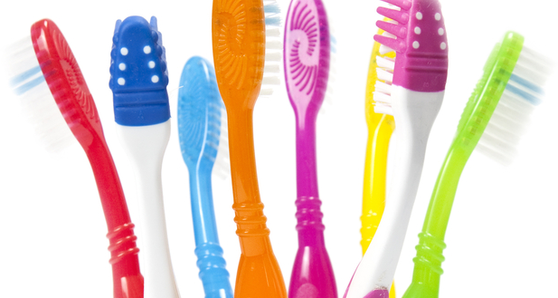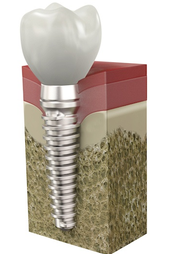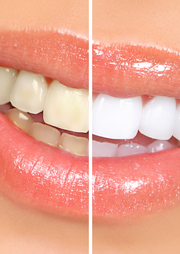To keep your mouth healthy, your daily behaviour should focus on correct practices for 360-degree prevention of problems such as decay, tartar, gingivitis, and periodontal disease. Effective prevention is based on the correct use of your toothbrush along with dental floss or interdental brushes.
Did you know that your toothbrush reaches only half of the surface of your teeth, while bacteria lurk everywhere in your mouth?
Toothbrush
It must be easy to use and effective in removing dental plaque without damaging the tissues (gums and enamel), so it must have the following characteristics:
-
suitable size of the handle and head depending on the age and ability of its user;
-
suitable size of the head in relation to the size of the mouth;
-
synthetic soft or medium bristles; hard bristles are not advisable because, if too much strength is applied, they may cause gum recession and lesions along the neck of the teeth, which will require composite fillings.
The effectiveness of electric and manual toothbrushes is comparable and electric toothbrushes are particularly suitable for individuals who are not able to use manual toothbrushes correctly.
Toothbrushes should be replaced whenever the bristles look bent or worn, on average every 90 days.
You should brush your teeth at least three times a day for three minutes each time and, in any case, whenever you need to remove traces of food.
It is important to learn the appropriate brushing technique, which usually involves:
-
placing your toothbrush at a 45° angle in relation to your gumline;
-
moving the toothbrush gently along the inner and outer surface of each tooth in such a way as to remove the plaque away from the surface of the tooth and gum (basically, from the gum towards the outside of your mouth);
-
avoiding movements that are too energetic and not insisting on the same area, as this may cause abrasion of the neck of the teeth and shrinking of the gums (gingival recession);
-
remembering to brush the masticatory surfaces as well as your tongue!
Dental floss
Dental floss is an indispensable tool to clean the spaces between the teeth (interproximal spaces) that cannot be reached by your toothbrush.
All the spaces must be cleaned, including the areas after the last teeth of both dental arches on both sides, at least once or twice a day.
Interdental brush
The thickness of interdental brushes must correspond to the size of the gaps between the teeth, remembering that slight pressure should be applied in order to fit the interdental brush in between the teeth.
Interdental brushes must be used at least once a day, preferably in the evening after brushing your teeth.
In order to be effective, they must be moved back and forth in each interdental space at least ten times.
Mouthwash
When the traditional mechanical devices are not enough, an antibacterial mouthwash may contribute to ensuring accurate and complete oral hygiene if used in combination with a toothbrush and dental floss / interdental brush.
Mouthwashes can be used as part of the daily oral hygiene routine or for more specific purposes, such as pre- or post-surgical dental treatment.
One of the key features of everyday-use mouthwashes is their actibacterial action, which eliminates as much plaque as possible, protects the gums from inflammation and irritation, and counters the bacteria causing halitosis.
Mouthwashes used for more specific pre- and post-surgical purposes are usually Chlorhexidine-based.
When should I go to the dentist for a check-up?
Preventing diseases of the teeth and gums relies on periodic check-ups performed by a dentist (at least once a year), while a dental hygienist looks after professional tooth cleaning, or debridement, (at least once a year) and can provide patients with all the information they need to keep a healthy smile.
Prevention of dental caries may also involve delivering systemic fluoride to children, a practice called fluoride therapy.
The fluoride is bonded to the elements of developing teeth making them stronger and more resistant to acid attacks by bacteria. Taking systemic fluoride (in pills) during adulthood, after the teeth have erupted, is however useless.
It is advisable to start a fluoride therapy at birth and interrupt it when the second molar erupts, around the age of 12. It has been observed that patients having taken fluoride are 80% less likely to develop decay in comparison to the general population.
Halitosis or bad breath:
This condition can affect anyone (children, adults, and the elderly) and cause embarrassment, especially in interpersonal relationships. In most cases, it can be ascribed to poor dental health or bad habits, which can be easily corrected. Treatment is often successful and the following should be considered:
-
Accurate tooth brushing is essential to avoid bad breath. Poor hygiene does not remove food debris and favours the accumulation of a thin film (bacterial plaque) on the teeth, gums, and tongue. Bacteria use these materials to produce compounds which are the main cause of bad smell.
-
The action of saliva is important to keep your mouth clean, so all situations causing a dry mouth (xerostomia) contribute to halitosis.
-
All conditions affecting the oral cavity (gingivitis, periodontitis, extensive decay, and diseases of the mucosa) increase halitosis. It is therefore vital to keep your mouth healthy by undergoing periodic check-ups so that your dentist can assess the state of your teeth and gums.
-
Bad breath can also be caused by certain foods: garlic, onion, leek, and some spices can cause your breath to have a bad smell for up to 72 hours after eating them. Alcoholic beverages are a common cause of bad breath.
-
Tobacco smoking also gives the mouth a characteristic and persistent smell, partially due to volatile sulphur compounds.
Halitosis may also be caused by inflammatory conditions such as sinusitis and tonsillitis or by bronchial and gastric diseases.
If you suffer from halitosis, the best solution is to speak to your dentist about it, in order to identify the causes of the bad smell and solve the problem.









